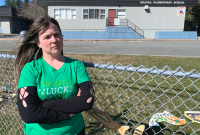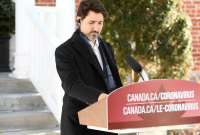Support strong Canadian climate journalism for 2025
British Columbia will spend $5 billion to help individuals, businesses and services endure the economic stresses of the COVID-19 pandemic, Premier John Horgan said Monday.
"There has to be hope as we get through these challenging times," he told a news conference at the legislature. "I firmly believe by working together all of us will get through this."
The government's plan will see $2.8 billion spent on people and services, and $2.2 billion on businesses and economic recovery after the pandemic.
A dozen members of the B.C. legislature — which has 87 members — from the minority government New Democrats, the Opposition Liberals and the Green party met Monday to pass two pieces of legislation. The legislative measures allow the government to change employment standards to ensure nobody loses their job due to COVID-19 and gives the province the authority to spend the money in its plan.
B.C. reported three additional deaths related to COVID-19 and 48 new cases of the respiratory virus on Monday. Provincial health officer Dr. Bonnie Henry said 472 people in B.C. have tested positive for COVID-19.
The three deaths brings the total number of fatalities related to the new coronavirus to 13.
"We are very saddened, of course, by the passing of these people," Henry said in announcing the latest deaths.
Horgan said the government's economic plan includes direct payments of $1,000 to people who are eligible to receive Employment Insurance, and businesses can expect to defer payments of the carbon and employer health taxes.
The carbon tax, scheduled to increase to $45 per tonne from $40 per tonne, will not go ahead on April 1, he said. Motorists in B.C. currently pay 8.89 cents per litre in carbon tax.
Horgan said B.C.'s approach builds on the $82 billion plan announced last week by the federal government. He said the B.C. plan supports people worried about paying bills and staying afloat.
There will be targeted tax relief and support for renters to make sure no one is evicted because of the novel coronavirus, the premier said.
"People need help now. Businesses need help now," said Horgan. "In extraordinary times, extraordinary measures are required."
Finance Minister Carole James said the plan is a starting point and will "evolve as the situation evolves."
She said $1.7 billion will be devoted to fund critical services, including health care, housing and helping families and people with disabilities. James said $1.1 billion will boost the income of people affected by COVID-19.
She said student loan payments will be paused until Sept. 30 and businesses can delay filing taxes until the end of September.
"The plan is a first step but a critical step," James said. "The pandemic will present extraordinary hurdles for all of us."
B.C.'s 2020-21 budget, which was forecast to end in a surplus when it was presented last month, will be hit hard by the pandemic, she added.
"There is no question we are impacted as every jurisdiction across the world is impacted," James said.
Health Minister Adrian Dix said B.C.'s recent move to cancel elective and scheduled surgeries has increased the number of beds available at B.C. hospitals in anticipation of "things about to come."
He said hospital bed capacity in B.C. regularly measures just above 100 per cent, but in the past week the capacity dropped to 68.6 per cent, with 3,632 available beds.
"We are preparing for the circumstances that are before us," Dix said. "We are preparing for the weeks that are to come."
Henry said of the three deaths announced Monday, two were connected to long-term care facilities in Metro Vancouver at the Lynn Valley Care Centre and Haro Park, with the third person being a resident in the Fraser Health region.
She said 100 people with the novel coronavirus in B.C. are now considered recovered and can be released from isolation.
"That is a really good thing to be able to put that on our books, finally," Henry told a news conference.
Henry said she senses people in B.C. have grasped the necessity of following her recent orders to stay home if sick, self-isolate for 14 days if they recently travelled outside the country and to practise physical distancing from others when outside.
She said she never imagined in her 30 years in public health that she would close schools and order people to keep their distance from each other.
"We're seeing people come to that recognition and there's been a transition over this past week," she said. "Just reflect on the monumental changes that we have asked society to do."
This report by The Canadian Press was first published March 23, 2020.





Comments